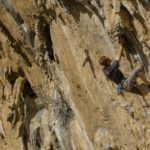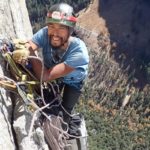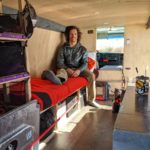The dirtbag lifestyle is a choice.
There was nothing forcing Alex Honnold to drop out of college and live in a van. Instead, he chose to become a “dirtbag” because he was passionate about climbing and had the means (it was his mom’s van) to drop everything and leave. Not everyone has the financial ability and longtime familial support system needed to move into the extra family vehicle and eat pb&js for breakfast, lunch, and dinner while pursuing their passion full time. Alex’s life wasn’t “easy,” but climbing every day doesn’t sound so rough either.
So, while there’s nothing “wrong” with being a dirtbag, it’s also important to understand the privilege behind it.
I’ll use myself as another example:
I’m a New England-raised, middle-class, white female with educated, loving parents, a dog, and a younger sister. That’s a lot of privilege right there.
My mother is a nurse but also has her master’s in biology, and my father is a chemistry Ph.D. Both my father’s parents were science professors. Thus education has always been valued in my family, and, thanks to my parents’ multiple degrees and usually well-paying jobs, we typically had the money to make it a priority. Growing up, I had shelves of books in my house and was read to nearly every night from infancy until I was literate enough to finish the Harry Potter series on my own. My parents were incredibly frugal, only shopping the sales at Shaw’s and saving Friendly’s ice cream treats for “good report card rewards,” but they had the financial cushion to start my college fund a few months after I was born. Now, thanks to their help, being in-state at the University of New Hampshire, and several merit scholarships, I graduated last week debt free—I’m very lucky.
Now what does this have to do with the dirtbag lifestyle? Clearly I’m not currently living “the dirtbag dream,” climbing 300 days a year and living out of the 2006 Subaru my mom helped me find and purchase. However, this fall I’m planning to give it a try, and it’s my upbringing and family’s financial blessings that will allow me to explore the West’s rocks post-graduation. No, my parents aren’t going to help pay for my adventures—I’ve been buying my own gas for years—but in a way they already have. I wouldn’t be able to take three months off to climb rocks if I had student debt. My loans would kick in in September, and I’d have to be searching for jobs to start paying them off for the next 10+ years: no van life, not showering for weeks, or waking up in Rifle Canyon.
I’m very lucky, and I do greatly appreciate everything my family has done for me, far beyond just supporting me through college financially, but I also have to recognize the opportunities my upbringing has given me and those it has set me up to take advantage of in the future. No, not every dirtbag has or has had it as easy as me, and there are plenty of climbers who work hard to make ends meet. All of us make sacrifices to climb, but, for many of us, our upbringing is a large part of why we’re able to take a week or two off to pull on Wild Iris pockets or grip Spanish tufas each year or decide to quit our jobs and explore for a few months. So go, embrace the dirtbag lifestyle if you have the chance—from what I hear it’s an experience you won’t regret—but don’t forget what set you up to have that choice.








